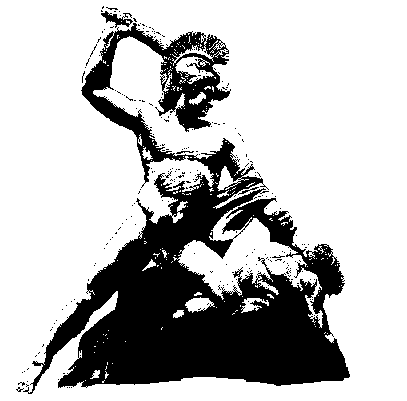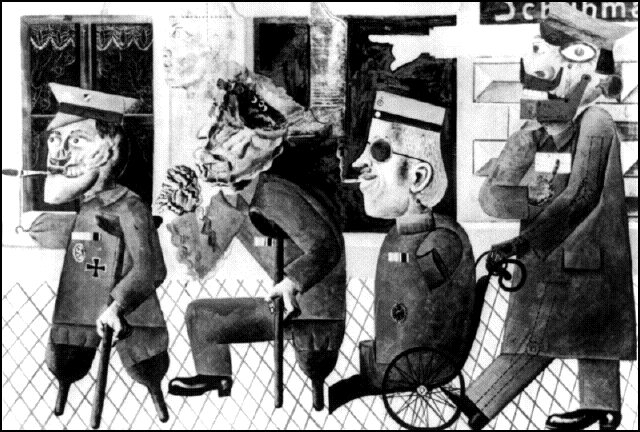War on Land
David G. Chandler
(Penguin)
 Clausewitz didn't say, "War is the continuation of politics by other means." He said,
Clausewitz didn't say, "War is the continuation of politics by other means." He said,War is nothing but a continuation of politics with the admixture of other means.
Subtle difference --- but key. On the other hand, Chandler tells us that all warfare must be divided into five parts: Grand Strategy (Let's destroy the Germans), Strategy (We'll invade the beaches at Normandy), Grand Tactics (We'll mass a huge flotilla of men and machines), Minor Tactics (We'll get to the beaches and then move inland as quickly as possible) and Logistics (However, all this depends on the weather). Such planning, Chandler reminds us, needs to be set up before even the first ship is launched.
Wars were much more easy-going in the past. The Assyrians (1380 BC) had two operating strategies: their soldiers were required to be monsters, and their main purpose was to get loot. On the other hand, Napoleon said that "The Channel is a mere ditch, and will be crossed as soon as someone has the courage to attempt." He never made it to England, but he did get to Moscow and, in the process, brought war home to the people by introducing universal conscription and by having his soldiers "live off the land" (robbing the poor peasants).
He divided his army into "large self-contained formations" which moved quickly to surprise the enemy. Instead of marching as a disciplined mass to the next encounter, his soldiers would be dispersed, go off, lollygag about, forage some wine and truffles, and then, at the appropriate time, would come together for the attack. This made for speed, and the famous French military stomach, on which, according to him, they traveled.
In attack, Napoleon was fond of massed batteries, and favored envelopment when attacking a weaker opponent. He also had massed, all-enveloping piles, which tormented him to distraction at Waterloo. You cannot develop grand strategy on the battlefield if you can barely stand to stay on your horse for more than a couple of hours. Thus, he may not have been all that able ere Elba because he forgot his daily dose of Preparation H.
Chandler tells us that there are Seven Classical Manoeuvres of Warfare, including "Envelopment of Both Flanks," "Feigned Withdrawal," "Attack from the Defensive Position" and "Penetration of the Centre." This latter was used during World War I at the Battle of the Somme. It caused almost a million casualties for a net gain of fifteen miles in eleven months. In other words, it didn't work. Lord Kitchener, England's Minister of War, was baffled. He said, "I don't know what is to be done. This isn't war."
It probably was war, since during the course of four and a half years, England, Germany and France managed to destroy --- physically or emotionally --- a majority of their young males between the ages of eighteen and thirty-five. And WWI did give us a few new gifts --- gifts that kept on giving: tanks, flame-throwers, aerial bombardment, phosgene gas, and a new model of confrontation known as trench-warfare --- the modus operandi not only in Western Europe, but in Turkey, the Balkans, the Middle East, in the Alps and, to a lesser degree, on the Eastern Front. It also gave us a Peace Treaty guaranteed to generate another war within years, with almost the same cast of characters.
Chandler has made an exhaustive inventory of humans wreaking carnage on other humans on land, if not the sea and air --- taking us from the Battle of Gaugamela (331 BC) to El Alamein (1942), while stopping off in Hastings, Agincourt, Austerlitz, and Gettysburg on the way. Unfortunately, his text looks to be set in massed 3-point Bodoni which is a pain to those of us teetering into our dotage, and the pictures --- of which there are a mountain --- turn up in very strange juxtapositions. The chapter on the Battle of France 1940 is interrupted by a two-page photograph of the damage at Hiroshima, and the narrative of the Battle of the Marne includes a picture of the Heavy Brigade at Balaclava, a painting of Napoleon at Polotsk, and a drawing from the Zulu War of 1879.
The quote from Napoleon and the variorum citations from Clausewitz come to us via the recently released Dictionary of Thematic Quotes (Oxford University Press). It also tell us that the newspapers and magazines of the day slightly elided that famous mot of John Nance Garner on the vice-presidency. He is alleged to have said that it wasn't worth "a pitcher of warm spit." That's a tribute to self-editing of newspapers and magazines in 1936, the year it was uttered. What he said was at once more scenic and more direct:
The vice-presidency isn't worth a pitcher of warm piss.
